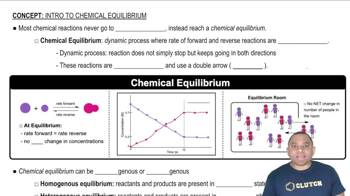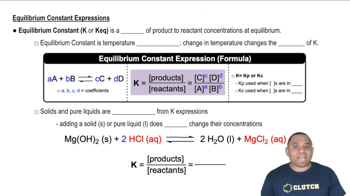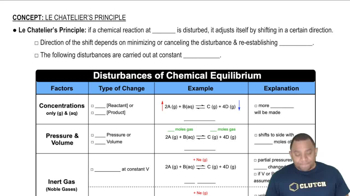Consider the reaction: H2(g) + I2(g) ⇌ 2 HI(g) A reaction mixture at equilibrium at 175 K contains PH2 = 0.958 atm, PI2 = 0.877 atm, and PHI = 0.020 atm. A second reaction mixture, also at 175 K, contains PH2 = PI2 = 0.621 atm and PHI = 0.101 atm. Is the second reaction at equilibrium? If not, what will be the partial pressure of HI when the reaction reaches equilibrium at 175 K?
Ch.16 - Chemical Equilibrium

Chapter 16, Problem 88
Is the question formulated correctly regarding the extraction of hydrogen from natural gas as per the given reaction CH4(g) + CO2(g) ⇌ 2 CO(g) + 2 H2(g) with Kp = 4.5 * 10^2 at 825K?
 Verified step by step guidance
Verified step by step guidance1
Identify the chemical reaction given: \( \text{CH}_4(g) + \text{CO}_2(g) \rightleftharpoons 2 \text{CO}(g) + 2 \text{H}_2(g) \).
Understand that \( K_p \) is the equilibrium constant for the reaction in terms of partial pressures, given as \( 4.5 \times 10^2 \) at 825 K.
Check if the question is asking about the feasibility of extracting hydrogen from natural gas using this reaction, which involves understanding the equilibrium position.
Consider the reaction conditions (temperature, pressure) and how they might affect the equilibrium position and the yield of \( \text{H}_2 \).
Ensure that the question is clear about what aspect of the extraction process is being evaluated, such as the efficiency, yield, or conditions required for optimal hydrogen production.
Key Concepts
Here are the essential concepts you must grasp in order to answer the question correctly.
Chemical Equilibrium
Chemical equilibrium occurs when the rates of the forward and reverse reactions are equal, resulting in constant concentrations of reactants and products. In the context of the given reaction, understanding how changes in conditions (like temperature and pressure) affect the equilibrium position is crucial for analyzing the extraction of hydrogen.
Recommended video:
Guided course

Chemical Equilibrium Concepts
Equilibrium Constant (Kp)
The equilibrium constant (Kp) quantifies the ratio of the concentrations of products to reactants at equilibrium for a given reaction at a specific temperature. For the reaction provided, Kp = 4.5 * 10^2 indicates that at 825K, the formation of products (CO and H2) is favored over the reactants (CH4 and CO2), which is essential for evaluating the efficiency of hydrogen extraction.
Recommended video:
Guided course

Equilibrium Constant Expressions
Le Chatelier's Principle
Le Chatelier's Principle states that if a system at equilibrium is subjected to a change in concentration, temperature, or pressure, the system will adjust to counteract that change and restore a new equilibrium. This principle is vital for predicting how the reaction will respond to alterations in conditions, such as increasing reactant concentrations or changing temperature, impacting hydrogen production.
Recommended video:
Guided course

Le Chatelier's Principle
Related Practice
Textbook Question
Textbook Question
A reaction vessel at 27 °C contains a mixture of SO2 (P = 3.00 atm) and O2 (P = 1.00 atm). When a catalyst is added, this reaction takes place: 2 SO2( g) + O2( g) ⇌ 2 SO3( g). At equilibrium, the total pressure is 3.75 atm. Find the value of Kc.
2
views
Textbook Question
At 70 K, CCl4 decomposes to carbon and chlorine. The Kp for the decomposition is 0.76. Find the starting pressure of CCl4 at this temperature that will produce a total pressure of 1.0 atm at equilibrium.
1
views
Textbook Question
The equilibrium constant for the reaction SO2(g) + NO2(g) ⇌ SO3(g) + NO(g) is Kc = 3.0. Find the amount of NO2 that must be added to 2.4 mol of SO2 in order to form 1.2 mol of SO3 at equilibrium.
1
views
